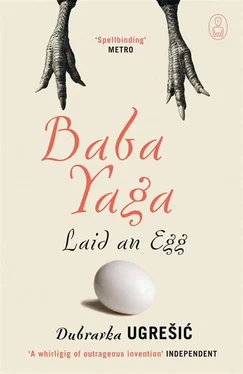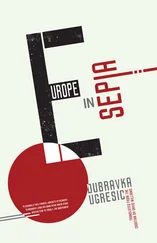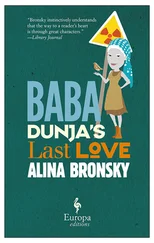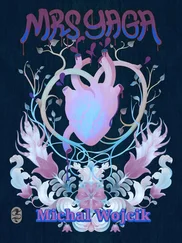‘I don’t like the dead,’ she told me. ‘I’d rather be in the company of the living.’
Her attitude towards the dead changed, too. Earlier they had each held their place in her memories, everything was set out in a tidy manner, as in an album of family pictures. Now the album was disintegrating and the photographs were scattered. She no longer spoke of her late sister. On the other hand she suddenly began mentioning her father more often – who was always reading and had brought books home, and who was the most honest man on earth. Yet she was compelled to bring him down a peg. The memory of him was permanently tainted by the greatest disappointment she had ever known, an event she would never forget , and which she simply could never forgive him for.
The source of the memory was altogether disproportionate to the bitterness with which she spoke of it, or so at least it seemed to me. My grandparents had some good friends, a married couple. When Grandma died, these friends looked after Grandpa, especially the wife, Grandma’s friend. My mother once happened on a scene of tenderness between the woman and my grandfather. Grandpa was kissing the woman’s hand.
‘I was sickened. And Mother said over and over: “Take care of my husband, take care of my husband!”’
It is highly unlikely that Grandma said anything of the kind. She had died of a heart attack. This pathetic plea – Take care of my husband, take care of my husband! – had been inserted into my dying grandmother’s mouth by my mother.
There was one more image that overlapped with the ‘sickening’ scene of the hand being kissed, and this was an image that my mother could not easily dismiss. When she was in Varna for the last time, Grandpa asked Mum to take him back with her, but she – drained by my father’s protracted illness and the gruesome throes of his dying, and then finally his death – feared the burden of the obligation, and refused. Grandpa spent his last years abandoned in a home for the elderly.
‘He tucked a little towel, my gift to him, under his arm, turned and went back into the house,’ she said, describing their last encounter.
It would seem that she had smuggled the towel into this last image. We always brought a pile of gifts every summer for my mother’s Bulgarian relatives. It wasn’t just that she liked giving things to people, she also liked this picture of herself: she would come back from the Varna she had left so many years before, feeling like the good fairy after distributing the gifts she had brought. I wondered why she had inserted that towel into the farewell scene with her own father. It was as if she was lashing herself with it, as if the towel he tucked under his arm was the most terrible possible image of a person’s decline. Instead of undertaking the grand, sincere gesture, which would have meant jumping through troublesome and time-consuming bureaucratic hoops with little guarantee of success, she stuffed a towel into Grandpa’s hand!
Her need to taint her dead was something new. These were not feasts but snacks, focused only on details, which I was hearing for the first time, and, indeed, she may have fabricated them on the spot to hold my attention and confide a secret she had never told a soul. Perhaps the fact that she was in possession of information relating to the dead gave her a glow of satisfaction. Recalling her late friends, sometimes, as if she’d just then decided to take their grades down a notch in the school records, she’d add importantly: I never took to him; I never liked her much either; They didn’t appeal to me; She was always stingy; No, they were not nice people.
Once or twice she even made as if to taint the image of my father, who was, in her words, the most honest man she’d ever known, but for whatever reason she relented, and left him on the pedestal where she herself had placed him after his death.
‘You weren’t exactly crazy about him, were you?’ I asked cautiously.
‘No, but I did love him.’
‘Why?’
‘Because he was so quiet,’ she said simply.
Dad was, indeed, a man of few words. And I remember my grandfather as being a quiet man. It hit me for the first time that both of them were not only quiet , but the most honest men Mum had ever known.
It may be that with this tainting of the memory of the dead she was easing her feeling of guilt for things she hadn’t done for them but might have, her guilt for what she had let slip by. She camouflaged her lack of greater attentiveness to the people closest to her with a hardness in judgement. She simply seemed afraid of caring more for others. At some point she had been scared of life just as she was scared of death. That was why she held on so firmly to her place, her stubborn coordinates, and shut her eyes to the scenes and situations that moved her too deeply.
Onion should always be well sautéed. Good health is what matters most. Liars are the worst people. Old age is a terrible calamity. Beans are best in salad. Cleanliness is half of health. Always discard the first water when you cook kale.
It may be that she had asserted things like this before, but I had paid no attention. Everything had got smaller. Her heart had shrunk. Her veins had shrunk. Her footsteps were smaller. Her repertoire of words had diminished. Life had narrowed. She uttered her truisms with special weight. Truisms gave her the feeling, I suppose, that everything was fine, that the world was precisely where it should be, that she was in control and had the power to decide. She wielded her truisms as if they came with an invisible stamp of approval, which she smacked everywhere, eager to leave her mark. Her mind still worked, her feet still moved, she could walk, though only with the help of a walker, but walk she did, and she was a human being who knew for a certainty that beans are best in salad, and that old age is a terrible calamity.
She often phoned the ‘old witch’, especially now that she was no longer able to go and visit her. Pupa was my mother’s oldest friend not only in terms of age, but in how long the two had known each other.
‘If it weren’t for the old witch, you wouldn’t be here today,’ Mum would say and repeat the family legend about how Pupa, as a newly minted resident, assisted the obstetrician when my mother was in labour. ( ‘Lord, what a hideous child,’ Pupa said when they pulled you out. My heart sank with fright. But you weren’t at all ugly, that was just the old witch having a giggle! )
‘Ah, Pupa! Her life has not been easy,’ Mum would say, pensively.
Pupa had been in the resistance movement, she had joined Tito’s Partisans and fought in the Second World War. She went through all sorts of things; she nearly died several times, and was furious at her daughter, also a doctor, claiming that all her troubles were her daughter’s fault. Without her, the old witch groused, I would have died quite nicely long ago.
She weighed barely eighty pounds, walked only with a walker and was half-blind – she saw the world only in blurred contours. She lived alone, obstinately refusing to go into a home for the elderly or live with her daughter and her daughter’s family. Neither would she agree to having a paid helper live with her. There was nothing, it turns out, to which she would agree. So her daughter was forced to come by every day, and there was a cleaning lady, who she often replaced, who came daily. Pupa sat there in her flat, with her legs tucked into a huge furry boot, an electric leg warmer. Sometimes she would turn the television on and stare at the blurred images on the screen. And then she’d turn it off and sniff the air. Neighbours, ah, those damned neighbours were piping rotten gas into her flat again through the central heating system. That was her phrase, ‘rotten gas’, because the whole building stank of rot from it. She drove the cleaning lady to search every nook and cranny of the flat, to see if there wasn’t something decaying somewhere, a dead mouse, or food, but the cleaning lady swore there was nothing. Except for the rotten gas there was nothing else which troubled her life. The problem was her death: it simply wouldn’t come. If it had crawled in through the central heating system, she would have gladly given herself over to it. Death doesn’t smell. It is life that stinks. Life is shit!
Читать дальше












